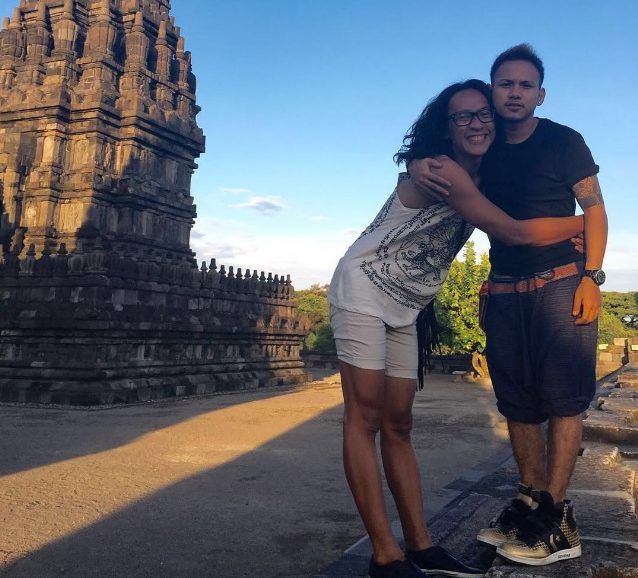By Hendri Yulius
Just a couple of months after Indonesia’s national meltdown over lesbian, gay, bisexual and transgender rights, rumours of a “same-sex marriage” between Indonesian comedian Aming Supriatna Sugandhi and Evelyn Nada Anjani pushed the issue back into the spotlight. Members of the House of the Representatives (DPR) quickly weighed in, saying that the marriage should be investigated.
Dadang Sumarna, from the Office of Religious Affairs in Sukasari, Bandung, which registered their marriage, argued that it had followed the correct legal procedures. Celebrity Ria Irawan defended her friend, confirming that Aming had married heterosexually. She stated that he would never violate religious or legal norms in Indonesia and he valued marriage as a form of worship, or ibadah.
The main reason the wedding attracted such controversy is simply because of the unusual gender expressions of the couple. Aming has based his career on gender non-conformity and often presents as feminine. Evelyn, who also goes by the name of Kevin, often displays a more masculine appearance, and is sometimes assumed to be biologically male. This reverse gender expression was clear in a honeymoon photo from Prambanan Temple posted on Instagram: Aming is seen hugging Evelyn’s waist like a girl hugging her boyfriend. This photo only fuelled the rumours of a same-sex marriage between Aming and Evelyn.

In the days following the wedding, Indonesia’s voyeuristic entertainment media looked into Evelyn’s life before she met Aming. It was reported that since she was four, Evelyn had felt different to other girls. She soon began presenting as male, injected male hormone and chose a male name. Apparently this stopped after she met Aming.
The reverse gender expressions of Evelyn and Aming reflect the complexity of gender and sexuality issues and the inadequacy of Indonesian policy to cope with them. Same-sex marriage is not legal in Indonesia. The 1974 Marriage Law and the 2006 Population Administration Law (and its amended 2013 version) both state that a legal marriage is between a male and female, as husband and wife.
This definition is based on the biological sexes of the couple. It is assumed that the one born with penis acts in a masculine manner and identifies as male, while the one with a vagina has feminine mannerisms and identifies as female. Gender, as a social and cultural construct, must fit with the sex assigned at birth. Based on Indonesian law, transgender people will only be recognised as the opposite gender if they undergo sex-reassignment surgery. Since Aming and Evelyn are biologically male and female, their heterosexual marriage is legal according to law.
Although the term “gender” is becoming more common in daily conversations, it is still not present in the official Indonesian Dictionary (KBBI). Most members of the public still have trouble differentiating between gender and sex. Most Indonesians are, however, familiar with waria or male-to-female transgender identity, which has long been part of Indonesian society. While waria are generally more accepted than their gay and lesbian counterparts, they are tolerated only to a limited degree and in certain contexts, for example, in the entertainment industry.
Although the 2006 Population Administration Law legally acknowledges only two gender identities, in practice, the Indonesian government has recognised the waria identity. In the late 1960s, Jakarta Governor Ali Sadikin facilitated the establishment of a transgender organisation, Himpunan Wadam Jakarta. Wadam (wanita Adam, or female Adam) was used as a substitute for the derogatory terms banci and bencong. After Muslim clerics protested about the use of the word “Adam” to refer to transgender groups, wadam was replaced with waria(from wanita-pria, or female-male). The Ministry of Social Affairs also acknowledges the existence of waria, but unfortunately classifies them as “people with social welfare problems” (penyandang masalah kesejahteraan sosial), along with people with disability, street children, and gay and lesbian Indonesians.
Waria is difficult to translate accurately into English. Anthropologist Tom Boellstorff prefers to translate waria as male transvestite, although this still fails to capture the full range of waria subjectivities. According to Boellstorff, “waria almost never describe themselves as a ‘third gender’ but see themselves as men with women’s souls”. Documentary filmmaker Kathy Huang has also reported meeting waria who described themselves as men. “We believe we were born as men and must return to God as men,” one of her subjects said. Aming has never publicly stated whether he considers himself waria or transvestite, although he certainly often presents in this way.
Gender exists on a wide spectrum or continuum. The waria example demonstrates the important distinction between gender identity and gender expression. The former refers to how a person perceives oneself: male, female, a blend of both, or neither. It might be the same as biological sex, or it might not. Gender expression, meanwhile is more about how one expresses one’s gender identity, through mannerisms, appearance, clothing, and so on. It need not conform to cultural norms of masculine and feminine. Unfortunately, these complexities are not captured in Indonesian law, which continues to rely on biological categories.
Aming is a rare Indonesian celebrity who openly challenges existing cultural norms around body, sex and gender. In Dimas Djayadiningrat’s comedy Quickie Express, for example, Aming (along with Tora Sudiro and Lukman Sardi) played a gigolo who enjoyed his job, the kind of character seldom found in Indonesian films. This continued in Lucky Kuswandi’s Madame X, where he starred as a transgender superhero battling against conservative groups threatening Indonesian pluralism.
With his marriage to Evelyn and their reversed gender expressions, Aming is also challenging existing norms in his real life. He is contesting the biological basis of identity and showing how fluid gender can be — something that Indonesian policy makers still need to learn.
Hendri Yulius is a researcher and writer. He is the author of a number of books, including Coming Out, now available at Gramedia. He holds a master’s degree from the Lee Kuan Yew School of Public Policy, National University of Singapore.
This article was originally published on Indonesia at Melbourne, a blog that presents analysis, research and commentary on contemporary Indonesia from academics and postgraduate students affiliated with the University of Melbourne. It aims to stimulate debate and provide a forum for exchange of information and opinion on current events in Indonesia. You can read the original article here.




